Donald J. Robertson's Blog, page 30
June 6, 2023
Recommended Reading on Stoicism
I often get asked “What should I read first?” by people who are getting into Stoic philosophy. Obviously, it depends. Are you talking about classics or modern books?Are you looking for in-depth academic texts or easy-to-read self-help guides? There are many books available now. Some are much better than others. (Most are okay but one or two are not worth reading.) My own books on Stoicism include Stoicism and the Art of Happiness, How to Think Like a Roman Emperor, and Verissimus: The Stoic Philosophy of Marcus Aurelius.
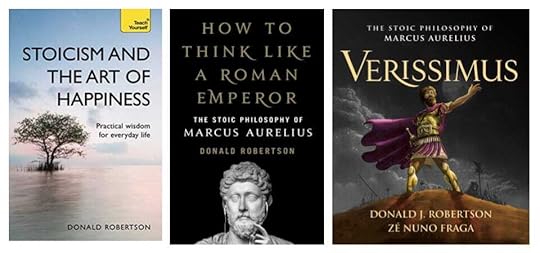
This guide consists of the other books on Stoicism, which I would recommend. I’ve tried to keep it simple by listing a handful that I think generally provide a good place to start, with some notes on why I’ve included them. Please comment below with your own favourites, and any you think I may have overlooked.
Stoicism: Philosophy as a Way of Life is a reader-supported publication. To receive new posts and support my work, consider becoming a free or paid subscriber.
Modern BooksThe Daily Stoic (2016) by Ryan Holiday and Stephen HanselmanThe Daily Stoic: 366 Meditations on Wisdom, Perseverance, and the Art of Living is the best selling modern book on Stoicism. It contains an extensive selection of original translations from the ancient Stoic texts, with a modern commentary. So, actually, it could be in both ancient and modern categories here. Holiday’s The Obstacle Is the Way: The Timeless Art of Turning Trials into Triumph (2014) is another bestseller worth reading, although he describes it more as a book inspired by Stoicism than an introduction to the philosophy.
How to be a Stoic (2017) by Massimo PigliucciIn How to Be a Stoic: Using Ancient Philosophy to Live a Modern Life, Prof. Pigliucci shows that Stoicism can provide a philosophy of life consistent with a modern scientific worldview, and with atheism or agnosticism as well as different forms of religion. He provides many examples of everyday situations in which he found Stoic philosophy helpful in his own life, and he also draws upon many examples from the lives of others to show how Stoic attitudes and behaviours can contribute to a more fulfilled and emotionally resilient way of living.
Lessons in Stoicism (2019) by John SellarsLessons in Stoicism: What Ancient Philosophers Teach Us About How to Live is a concise introduction to the philosophy, less than a hundred pages. Dr. Sellars is one of the leading academic experts on the subject, and the current chair of the Modern Stoicism nonprofit organization. This is a quick read which helps to clear up some common misconceptions about Stoic philosophy.
A Guide to the Good Life (2008) by William B. IrvineA Guide to the Good Life: The Ancient Art of Stoic Joy was the first modern bestseller on Stoicism. It’s easy to read and has a practical focus, although Prof. Irvine says he’s talking about a modified version of Stoicism that differs from ancient Stoicism insofar as it is more focused on the goal of tranquillity (ataraxia) than virtue (arete). “The resulting version of Stoicism, although derived from the ancient Stoics,” he says “is therefore unlike the Stoicism advocated by any particular Stoic.” Many people find this a more practical approach, though.
Stoicism: A Very Short Introduction (2018) by Brad InwoodThis is perhaps the most academic text on the list but it’s quite easy to read, and very concise, at just over 100 pages. Prof. Inwood is one of the leading modern scholars of Hellenistic philosophy so his description of ancient Stoicism can be considered authoritative — it’s certainly much more reliable than many of the Stoicism books and articles you’ll find online.
Stoic Wisdom (2021) by Nancy ShermanStoic Wisdom: Ancient Lessons for Modern Resilience provides another great introduction by an academic. Prof. Sherman was formerly the chair of ethics at the US Naval Academy and brings a military perspective, including a valuable philosophical discussion of PTSD and moral injury.
Wise Up (2022) by Karen DuffyWise Up: Irreverent Enlightenment from a Mother Who's Been Through It is perhaps the most “fun” read in this list. Karen “Duff” Duffy is a former MTV presenter, model, and film actor, who turned to Stoicism as a way of coping with chronic pain and illness. Duff has a very humorous, down-to-earth, and engaging way of writing, which makes it essay to see how Stoic wisdom could help in everyday life, even when we’re faced with very challenging situations.
 These books don’t exist anymore!Translations of Ancient Books
These books don’t exist anymore!Translations of Ancient BooksMany old translations are now in the public domain. These are often available free online or in cheap printed editions. However, modern readers tend to prefer modern translations, which they may find easier to understand.
The Discourses of EpictetusDiscourses, Fragments, Handbook (2014), translated by Robin Hard with an introduction by Christopher Gill, is a good modern translation.
The Meditations of Marcus AureliusMeditations: A New Translation (2003), translated by Gregory Hays, is the most popular modern translation. I prefer the more recent Meditations: The Annotated Edition (2021) by Robin Waterfield, though.
The Moral Letters of SenecaLetters on Ethics: To Lucilius (2017), translated by Margaret Graver and A.A. Long, is a good modern translation.
Thank you for reading Stoicism: Philosophy as a Way of Life. This post is public so feel free to share it.
Extra ReadingPierre Hadot’s books Philosophy as a Way of Life, What is Ancient Philosophy?, and The Inner Citadel, are among my favourites and although written by a highly-regarded academic they’re quite easy to read.
A.A.Long’s Epictetus: A Stoic and Socratic Guide to Life is an academic analysis of the Discourses of Epictetus, which does for Epictetus what Hadot’s The Inner Citadel does for Marcus Aurelius.
James Stockdale’s Thoughts of a Philosophical Fighter Pilot is a popular collection of essays on Stoicism by a former vice admiral in the US Navy, who was captured by the North Vietnamese at the start of the Vietnam War. Stockdale used Stoic philosophy to survive being incarcerated and tortured.
What have I missed? Please add your comments below. Thanks!
June 1, 2023
What is a thing’s real nature?
CommentWith everything which entertains you, is useful, or of which you are fond, remember to say to yourself, beginning with the very least things, “What is its nature?” If you are fond of a jug, say, “I am fond of a jug”; for when it is broken you will not be disturbed. If you kiss your own child or wife, say to yourself that you are kissing a human being; for when it dies you will not be disturbed. — Epictetus, Enchiridion 3
This is a short passage but one of the most notorious in the Stoic Handbook. One of the basic practices of Stoicism is the ability to describe things in an objective way that seems to have been inspired by natural philosophy or ancient Physics. Anaxagoras was the first person to be called a “philosopher” at Athens and he taught Pericles, the great statesmen, to view events like solar eclipses as natural phenomena rather than warnings from the gods. This naturalistic perspective, it was claimed, actually gave the Athenians an advantage in battle against more superstitious Greeks, like the Spartans, who would refuse to fight because they were afraid of omens.
Today we talk about clients in therapy viewing events from a scientific perspective, in a neutral and value-free way. Epictetus describes this as asking “What is its nature?” He means that we should stick to the facts without imposing strong value judgments and describe things in a matter-of-fact way. You can view the philosophical ideal of “plain speaking” (parrhesia) as an attempt to strip away the rhetoric used to evoke strong emotions. Today we would also see this as a form of decatastrophizing, by learning to describe events in plain language and view them more objectively.
May 25, 2023
Your eBook of Marcus Aurelius in the Roman Histories
If you’re a paid subscriber, you will be able to download and share with your friends. This is a five-page eBook, called Marcus Aurelius in the Roman Histories, including a carefully edited and formatted selection from the ancient biographies.
Great writing, good detail, interesting fact and written with clear passion and interest. Thank you. — Kim Koskinen
I've had the whole text cleaned up and edited to make it easier for modern readers. You can download the EPUB or PDF files free of charge and read them on any device using an e-reading app like Google Play Books, Apple Books, Calibre, or Adobe. NB: PDF is better for printing; EPUB is better for e-readers. Leave your comments below. Enjoy!
This summary e-book is quite a bit of history compiled together. Marcus had a complex life with many issues to deal with. It is a wonder that he developed such inner calm and serenity. — James D. Joslin
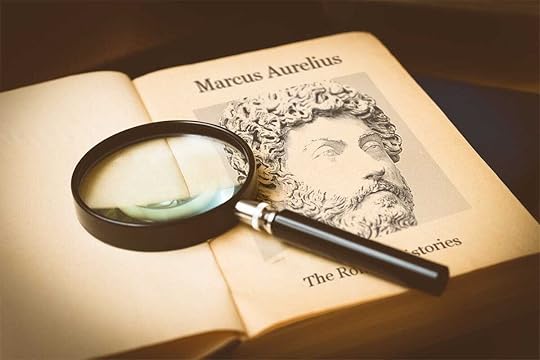
There are several excellent modern biographies of Marcus Aurelius available. However, most of the material they draw upon can be found in a handful of ancient histories, which are relatively brief and fairly easy to read. This e-book brings together the main sources for the life of Marcus Aurelius in a new edition, specially designed to be read online or on mobile devices. The chapters included are small excerpts, containing the passages most relevant to the reign of Marcus Aurelius, from the following three histories.
The History of the Empire from the Death of Marcus by Herodian of Antioch, a minor Roman official who witnessed the reign of Commodus first-hand.
The Roman History (Historia Romana) of Cassius Dio, who served as a senator under Commodus. I’ve also included Cassius Dio’s chapter on the life of Commodus as an appendix, as it provides a valuable addition to the writings that more directly address the reign of his father, Marcus Aurelius.
The Augustan History (Historia Augusta) is a collection of biographical chapters, attributed to four different authors. In addition to the chapters on Marcus Aurelius I’ve also included those on his co-emperor Lucius Verus and the usurper Avidius Cassius as they pertain directly to the relationship between these men and Marcus.
Stoicism: Philosophy as a Way of Life is a reader-supported publication. To receive new posts and support my work, consider becoming a free or paid subscriber.
My Favourite Quotation[Marcus Aurelius] was concerned with all aspects of excellence, and in his love of ancient literature he was second to no man, Roman or Greek; this is evident from all his sayings and writings which have come down to us. To his subjects he revealed himself as a mild and moderate emperor; he gave audience to those who asked for it and forbade his bodyguard to drive off those who happened to meet him. Alone of the emperors, he gave proof of his learning not by mere words or knowledge of philosophical doctrines but by his blameless character and temperate way of life. His reign thus produced a very large number of intelligent men, for subjects like to imitate the example set by their ruler.
Many capable men have already recorded the courageous and moderate enterprises, marked by both political and military excellence, which he undertook against the barbarian nations to the North and in the East; but the events which, after the death of Marcus, I saw and heard in my lifetime – things of which I had personal experience in my imperial or civil service – these I have recorded. — Herodian
If you’re a paid subscriber to this newsletter, you can download the whole eBook via the links below.
May 19, 2023
The Saad Truth about Stoicism
Earlier today I had the pleasure of speaking with Gad Saad, professor of marketing at Concordia University, via Zoom. Later we met for coffee, as we both live in Montreal, and, joined by Prof. Saad’s wife, we continued our conversation about behavioural psychology, persuasion, and Stoicism. Prof. Saad is the author of the bestselling book The Parasitic Mind: How Infectious Ideas Are Killing Common Sense, and the forthcoming The Saad Truth about Happiness, in which he discusses ancient Greek philosophy. I really enjoyed our chat. Prof. Saad is fascinated by Stoicism and I’m looking forward to hearing more about how he interprets Stoic philosophy in light of insights derived from evolutionary behavioral science.
Stoicism: Philosophy as a Way of Life is a reader-supported publication. To receive new posts and support my work, consider becoming a free or paid subscriber.
You can download and listen to the audio podcast of our conversation on Stoicism via Podbean or Apple or watch the YouTube video below. You can follow Gad Saad on Twitter.
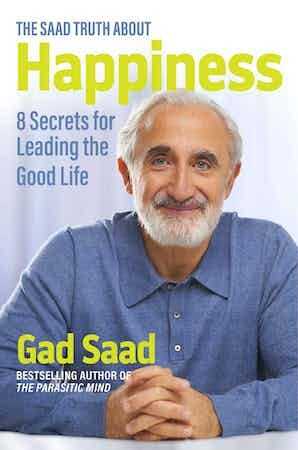
Thank you for reading Stoicism: Philosophy as a Way of Life. This post is public so feel free to share it.
May 18, 2023
Join us for Philosophy and Resilience Online
What is emotional resilience? How can ancient philosophies such as Stoicism help us to become stronger in the face of adversity?
In two days (Sat May 20th @ 12pm EDT), I’ll be speaking at our Plato’s Academy Centre virtual event Choose Not to Be Harmed: Philosophy & Resilience. Below you can check out the final program of speakers. Please come and join us; everyone is welcome. Donations for the nonprofit are always welcome but tickets are free of charge.
If you're unable to attend live, rest assured that all registered participants will receive the recording after the event.
Program"Stoic Consolations on Attachment and Loss" Nancy Sherman, Georgetown University, author of Stoic Wisdom: Ancient Lessons for Modern Resilience
"On Plutarch and Resilience" by Donald Robertson, author of Build your Resilience and How to Think Like a Roman Emperor
"Resilience and Skepticism" by Prof. Richard Bett, Johns Hopkins University, author of How to Keep an Open Mind
“Lust for Life: Cultivating Resilience” Karen Duffy (feat. Francis Gasparini) former MTV presenter, and author of Wise Up, and Backbone
“Beyond Stoicism: Plutarch on Never Getting Bullied Again” by Prof. Michael Fontaine, Cornell University, author of How to Grieve: an Ancient Guide to the Lost Art of Consolation
"The Meaning of 'Resilience" Prof. William 'O. Stephens, Creighton University, author of Marcus Aurelius: A Guide for the Perplexed, translator of Bonhöffer’s The Ethics of the Stoic Epictetus
Panel featuring Mark Hardie, Tim LeBon, and Donald Robertson
Keynote: "Introducing the STOIC Framework to Help you Become More Resilient" by Tim LeBon
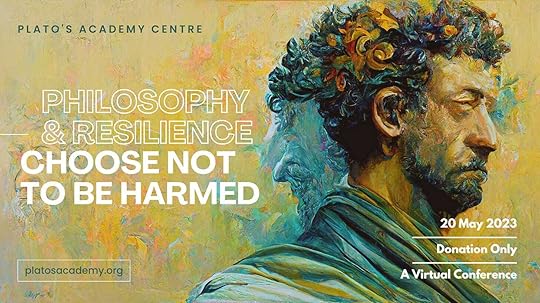
If you're aware of someone who is going through a challenging time and could benefit from building their emotional resilience, we kindly ask you to share the link provided below.
https://philosophy-resilience.eventbr...
THANK YOU AND WE WILL SEE YOU ALL THIS SATURDAY AT 12PM EDT!
Thank you for reading Stoicism: Philosophy as a Way of Life. This post is public so feel free to share it.
May 15, 2023
How Stoicism can Make you a Better Leader
 Photo by Craig Hughes on Unsplash
Photo by Craig Hughes on UnsplashHow better or how otherwise could a man be a good ruler or live a good life than by studying philosophy? For my part, I believe that the good king is straightway and of necessity a philosopher, and the philosopher a kingly person. — Musonius Rufus
The ancient Stoics believed that it was essential for anyone who wants to be a leader to study philosophy. Indeed, the most famous Stoic of all was Marcus Aurelius, a Roman emperor, who saw Stoicism as essential training for his role. The Stoic teachers who came before him wrote entire books on leadership, under titles such as On Kingship or The Statesman. Most of these are lost, unfortunately, but in the 1st century AD, the famous Stoic teacher Musonius Rufus, gave a lecture titled That kings also should study philosophy, which survives today. Kingship is one type of leadership, but as we’ll see, if we adapt the words of Musonius’ lecture, most of what he says is still very relevant, and provides us, in summary form, with a Stoic manual for modern-day leadership.
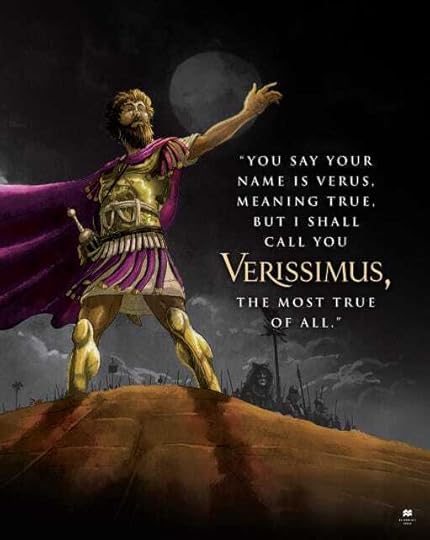 Poster from Verissimus, the graphic novel, copyright Donald J. RobertsonLeaders also should study Stoicism
Poster from Verissimus, the graphic novel, copyright Donald J. RobertsonLeaders also should study StoicismOne day, one of the kings of Syria, which was at the time a client-state of the Roman empire, was visiting Rome. He sought counsel from the Stoic philosopher, Musonius Rufus, who advised him as follows concerning the qualities required to become a great leader. (I’m paraphrasing his advice here and putting it into modern language.)
“Do not imagine,” said Musonius, “that there is anyone for whom it is more appropriate to study philosophy than you, and that is precisely because you are a king.” The primary duty of a king, or any leader, is to protect and benefit his people, but for this he must, of course, know what is good or bad for them, what is helpful or harmful, etc. Philosophers, such as the Stoics, study precisely these questions, having made it their business to learn what contributes to a person’s happiness or unhappiness. It therefore seems obvious, says Musonius, that leaders should train in this type of philosophy.
In order to illustrate this further, he divides the qualities of a leader into four headings, which correspond to the cardinal virtues of philosophy: justice, temperance, fortitude, and wisdom.
Justice / FairnessFirst of all, it is the responsibility of, and indeed necessary for, our leaders to possess the virtue of justice. They must be good judges of what is fair or unfair, helpful or harmful, among their people, so that each individual receives exactly what he deserves. How could anyone manage justice among others, asks Musonius, if he is not a just person himself? How, moreover, could anyone be just who has not studied the nature of justice?
Leaders should therefore study philosophy, because without doing so they will have a limited and superficial understanding of virtues such as fairness and justice. Someone who has invested time in studying the concept of justice will, of course, grasp it better than someone who has not. We all know that people typically argue with one another about what is just or fair or beneficial, and have differing opinions. That is because most of them have not dedicated themselves to formulating a clear definition of justice, in the way that philosophers have. As leaders are responsible for many individuals, he says, it is more incumbent upon them than a private citizen to have a clear understanding of the nature of justice.
Temperance / ModerationSecondly, it is essential for a good leader to exercise the virtue of self-control and also to help his subjects acquire the same quality. When leaders exhibit genuine temperance and moderation there is no recklessness either on their part or on the part of their people. Lack of self-control brings about the ruin both of the leader and his people. How, though, can anyone acquire self-control unless he makes an effort to curb his desires? And how could any leader who lacks discipline help his people to become disciplined?
Stoic philosophy teaches such self-control, particularly by teaching us how to rise above pleasure and greed, and to admire simplicity and avoid extravagance. Stoicism also trains us in a form of self-awareness, such as learning to control our own tongue. It leads to discipline, order, and courtesy, and generally improves our character and behaviour. When an ordinary person has these qualities they live with dignity in their personal life. If they are present in a leader, though, they make him worthy of being in a position of leadership.
Fortitude / CourageThird, a true leader must exhibit the virtue of courage. How else would someone acquire fearlessness, though, than by having a firm conviction that death and hardships are not evils? For many people are afraid of death and of hardships in life but Stoic philosophy teaches us how to be unafraid of such things. Hence, leaders ought to possess courage, and they must set about the study of philosophy, in order to acquire the insights that dispel fear.
Prudence / WisdomLeaders must also have the virtue of wisdom. It is necessary for them to handle verbal disagreements, just as kings and generals must sometimes face military conflicts. When a leader is weak at handling disputes, and weak at defending their opinion, they are often misled into accepting the false as true, which is the price we pay for lacking wisdom.
Philosophy by its very nature confers upon its students perhaps more than anything else the ability to handle debates, to distinguish the false from the true, and to refute the one and to confirm the other. Even professional speakers are confounded when philosophers confront them with logic. Any aspiring leader should therefore wish to be capable of rational debate. He must study philosophy in order to master reasoning, so that he no longer need fear being misled by others.
Musonius says that a great king in the distant past was like a father-figure and a “living law” to his people. The ideal ruler brought about good government and harmony among his subjects, putting an end to lawlessness and dissension by his very example. How could anyone become such a role model, though, unless he had a good education and cultivated all the virtues mentioned above?
True leaders must therefore aspire to be as flawless as possible, in their words and actions, because their people look toward them to set an example. If there’s any other sort of education which could guide a person to virtue, it should be placed alongside philosophy, says Musonius, and a comparison made to see which is more suitable for producing a good leader. If we can find a better guide than philosophy in this regard, by all means, we should use it.
Some arts, he says, only cultivate the body, while others cultivate the mind, but not in ways that lead to self-control. Only Stoic philosophy aims to teach genuine self-control by teaching a set of values, which focus on making virtue our highest good and priority in life. What else would be more useful to a leader who wished to become good than the study of this sort of philosophy? A good leader, he says, is necessarily a philosopher, and a good philosopher, by nature, exhibits leadership qualities.
Is it possible, Musonius asks, for anyone to be a good leader unless he is a good person? Is a good person always a philosopher? Musonius is certain that he must be insofar as philosophy, the love of wisdom, is actually the pursuit of goodness, or what we call self-improvement today. A good leader is, therefore, necessarily a philosopher, committed to the pursuit of self-improvement and wisdom.
However, are all genuine philosophers necessarily good leaders? The key qualities of a leader consist in the ability to govern people and cities well, and to be worthy of being put in charge. A Stoic philosopher, says Musonius, aspires to be intelligent, disciplined, dignified, and a good judge of what is just, fair, and appropriate. He is efficient when it comes to putting his plans into effect, patient under hardship, courageous, resolute in the face of danger, and also beneficent, helpful, and humane. Could anyone be found more fit or better able to govern? Even if such a person does not have many people under him, he is not for that reason less of a leader, for it is enough to lead one’s friends or one’s family or, for that matter, only oneself.
It is possible… for the world’s worst ruler to have many subjects, and for the world’s greatest ruler to have none.
Indeed, a physician who attends few patients is no less a physician than the one who attends many as long as he has skill and experience in healing. In the same way the musician who teaches only a few pupils is no less a musician than the one who teaches many, provided he knows the art of music. It is possible, in other words, for the world’s worst ruler to have many subjects, and for the world’s greatest ruler to have none. Indeed, the title of “leader” belongs to the person who has only one or two subjects just much as to the one who has many, as long as he has the character of a true leader, and thus deserves the name. Musonius concludes that Socrates called philosophy the “statesmanlike” and “royal” discipline because one who masters it immediately becomes a genuine leader.
After Musonius Rufus had spoken, the Syrian king who was consulting him told him how grateful he was for his words of advice. He added, “In return for this, ask of me whatever you wish for I shall refuse you nothing.” “The only favor I ask of you is to remain faithful to this teaching, since you find it commendable,” Musonius replied, “for in this way and no other will you best please me and benefit yourself.”
May 14, 2023
How to Think Like a Roman Emperor
I’ve recently finished writing my third book in a row about Marcus Aurelius. The most recent was a prose biography of his life, for Yale University Press’ Ancient Lives series, which focuses on how Stoic philosophy shaped his character, and should be out around Spring 2024. Prior to that, I’d written a graphic novel about him called Verissimus: The Stoic Philosophy of Marcus Aurelius, which was chosen by Amazon as an Editor’s Pick for Best History Book. However, the first in the trilogy was a self-help book called How to Think about a Roman Emperor, which combined history, philosophy and self-improvement advice based on cognitive-behavioral therapy (CBT).
Stoicism: Philosophy as a Way of Life is a reader-supported publication. To receive new posts and support my work, consider becoming a free or paid subscriber.
How to Think Like a Roman Emperor came out in 2019 and was reviewed in the Wall Street Journal. It was an instant bestseller, far outselling any of my previous books on Stoicism, and is currently approaching a quarter of a million units — in hardback, paperback, ebook, and audiobook. It has been translated into eighteen languages so far, including Greek, Japanese, German, Spanish, Arabic, and Persian. (But not French yet!) It has been read by groups of high school students and used on several university courses. I decided to write this article about it’s reception because it’s now been reviewed or rated by over three thousand readers on Amazon.
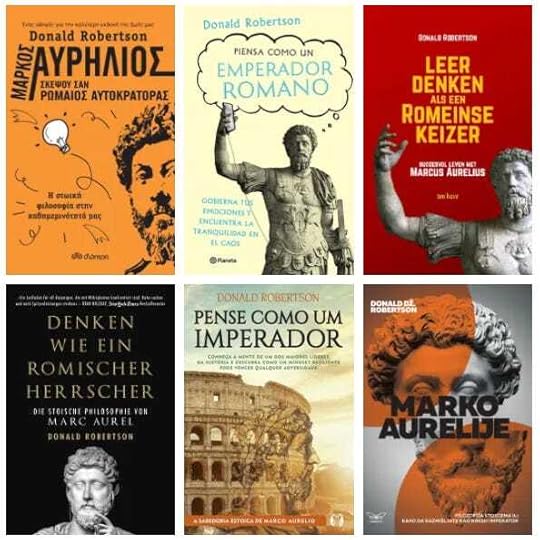 How I wrote Roman Emperor
How I wrote Roman EmperorI’d already written three books on Stoicism when I was invited, in 2018, to write another one, this time by St. Martin’s Press. I couldn’t simply write another introduction. I’d already done that with, Stoicism and the Art of Happiness, and there were plenty appearing by other authors. After thinking long and hard about it, I decided to write a different sort of book on Stoicism, one that focused on the example of a historical figure.
I asked myself how the Stoics themselves believed their philosophy should be taught and realized immediately that they would say that although books are valuable, role models are more important. So I reasoned that the best type of book would be one that focused on an actual Stoic from history. I also took inspiration from Plutarch’s Lives, which attempts to teach wisdom and virtue through biographical essays.
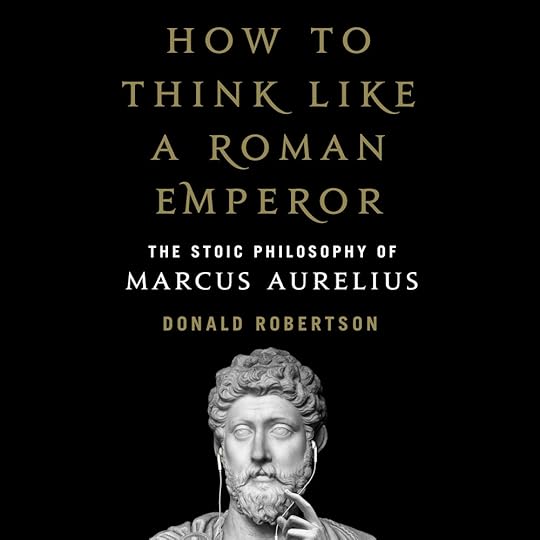
I tried to imagine that one day my daughter would read How to Think Like a Roman Emperor, to help me focus on expressing complicated ideas in plain language.
Finally, I also asked myself how to teach Stoicism to a child. I did this because my interest in subjects like philosophy and psychotherapy was originally academic and I know that sometimes I am in the habit of using technical language and arguments, which don’t appeal to everyone. I learned years ago to imagine explaining complex subjects to children — I believe it improves my own comprehension as well as the clarity of my writing. Luckily, I also had a real one ready to hand!
My daughter, Poppy, was about six or seven when I started writing How to Think Like a Roman Emperor. I was already used to telling her stories from Greek mythology, and also anecdotes from Diogenes Laertius’ Lives and Opinions of Eminent Philosophers. So I tried to imagine that one day she would read How to Think Like a Roman Emperor, to help me focus on expressing complicated ideas in plain language.
At first, I thought about using Zeno of Citium, the founder of Stoicism, as an example. There are some good anecdotes about him but not enough for a whole book. Instead of the first great Stoic of antiquity, I chose to write about the last one, Marcus Aurelius. We know far more about Marcus than we do about any other Stoic philosopher, indeed perhaps more than we do about any other ancient philosopher whatsoever. Why? Well, because he was an emperor.
We have several surviving accounts of his rule, by Roman historians, several excellent modern biographies, and also some archaeological evidence, and other bits and pieces. We can say quite a lot about his life. I decided that by combining biographical vignettes about Marcus with explanations of Stoic philosophy, and relevant self-help techniques based on modern evidence-based psychotherapy, I could write a book that would stand apart from other introductions to the subject.
Now I’m working on a similar book about Socrates, which will hopefully be available soon. I’ve learned that it can be hard work to combine different genres like this but readers seem to appreciate the end result: history, philosophy, and psychology can potentially complement one another in interesting ways.
Thank you for reading Stoicism: Philosophy as a Way of Life. This post is public so feel free to share it.
May 13, 2023
Marcus Aurelius: Enrollment Closing Now!
Enrollment will be closing shortly as the course begins tomorrow. This is your last chance to join us if you do want to take part!
If you missed this chance, make sure you stay on my newsletter for announcements about other courses in the future.
Una dabit quod negat altera.
One hour will give what another has refused.
Thanks once again for your support and feedback, and I look forward to seeing you in person on the course!
Warm regards,
Donald Robertson
May 12, 2023
Marcus Aurelius: Time is Running Out!
Serius est quam cogitas.
It's later than you think.
We've decided to extend the enrollment window just a little longer for you stragglers. You now have until Sunday before enrollment closes and you'll still be able to until then.
Thanks Donald for your personal perspectives, the anecdotes and breadth of applied experience with Stoicism; the practical and historical perspectives, using Marcus Aurelius' Meditations, were very insightful and valuable... The course concept and contents are highly recommended. I came close to turning this course down but am greatly relieved now that I registered at the last minute! –Sachigo
Thanks once again for your support and feedback, and I look forward to seeing you in person on the course!
Warm regards,
Donald Robertson
May 11, 2023
Marcus Aurelius: Enrollment Closes Today!
Utere non reditura.
Use the hour, it will not come again.
Today is your last chance to enroll on !
Remember, if you enroll on this version of the course, you'll also be receiving a $50 discount off the standard price, including e-learning and live webinars, as a reward for being a loyal subscriber to my email newsletter. There are two ways to pay:
Payment in full, with your $50 discount pre-applied at checkout.
Payment plan, split over three months, with your $50 discount pre-applied at checkout.
Note: If you're choosing the payment plan option you'll receive the discount off your first installment. That means you only need to pay $19 up front to enroll on the course!
You'll also have access to any future updates or improvements, via lifetime access. I'm also providing a three free e-books to people taking part in this course.
This course matters in ways that so many forms of education fail to even touch. It deals with your perspective: how you think, your attitude, how you perceive yourself and life, and what really matters in life... This course is an exploration of how to deal positively psychologically, cognitively, and socially with the human condition as dictated by Nature. I highly recommend it. – James D. Joslin
If you're interested but have questions, please feel free to get in touch. (I get loads of emails from people about courses and answer all of them personally.)
Thanks once again for your support and feedback, and I look forward to seeing you in person on the course!
Warm regards,
Donald Robertson



